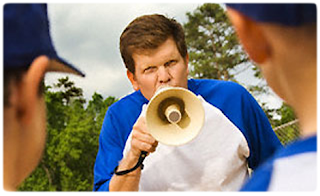 |
| There are no "We're #2" foam fingers. |
by Adam Metz
And now (drum roll
please . . . ) the Top 25 Longest Turds
in the World!
Or, not really. Forgive
the crass introduction, but I just keep waiting to see such a show break onto
the scene of one of the many reality shows gracing today's television networks.
Americans, we know, like
to rank just about everything (and I'd bet my house that there's a college fraternity somewhere with just such a Top 25 ranking . . .
but I digress).
We are a country obsessed with superlatives. Whether
we are talking about academics, sports, or professional eating, we have found a
way to determine who's the biggest, the fastest, and the best at just about
everything. Most of the discussions about sports revolve around who is number one. This college
basketball season is one of the most compelling in recent memories largely
because no team has risen head and shoulders above all others. The number one
team in the country has
fallen several times in just the past few weeks.
This alone should make us question the whole idea of
there even being a "Number One," except we can't stand the thought of that. Look at what has
happened in recent years in college football. From two opinion polls, to
computer rankings, to a combination of both . . . and now we're headed for a
four-team playoff: we just can't stand
the ambiguity of not knowing who is Number One.
 |
| Best athlete? No. Best mustache? Yes! |
It's always interesting to see the kinds of
programming that ESPN comes up with when they are in between major championship
coverage (as we are right
now). This week they've
created a tournament bracket to determine the greatest athlete of all time,
using their sports science metrics. Who was greater: Bo Jackson or Muhammad
Ali? Jim Brown or Dale Earnhardt Sr.? (seriously?)
American sports has devolved into a perennial pissing contest, constantly obsessing over
which conference is best, which athlete is the greatest, who makes the sweetest
dunk, who hits the longest home
run, and on and on they go.
Admittedly, most of these discussions are
superfluous exercises conjured
up simply to give hardcore fans something
to keep their interest in the offseason; hardly something to take too seriously. That is not to say,
however, that this obsession with Number
One doesn't have serious
side effects.
These seemingly harmless exercises in quantifying
greatness are being felt in
a real way in youth sports. Children grow up hearing their families as well as
the media obsess over the
best teams in the land, covering championships, and issuing constantly changing rankings. Watch
any post-championship game coverage and inevitably the sports personalities
will offer a "first look at next year's rankings." The desire to rank
Number One is insatiable.
Nowhere is this
more evident than with the Amateur Athletic Union - known more widely by their
abbreviation, AAU. If you
ever want to burst your bubble about the state of amateur athletics in the
United States, do a little research into AAU basketball. In his hard-hitting
book on youth sports, Game On, Tom
Farrey includes a fascinating chapter about J-Mychal Reese, an exceptional
basketball player who was ranked as the number one overall player in the country . . . among other sixth graders!
(Reese is now a freshman at Texas A&M).
The AAU website proudly includes their top
twenty-five power rankings in two divisions for boys, starting with fourth grade teams. These are national rankings. And these rankings are part of the genius of their
marketers. In order for these teams to be ranked, they must participate in certain sanctioned tournaments. Thus, the AAU
determines where (and how often)
these sanctioned tournaments are
held - often receiving huge financial incentives from the host site
(usually a resort or expensive hotel).
This has real life impact. This dictates to many families where they will spend their
vacations and their discretionary
income. After all, who doesn't want their child to be ranked Number One?
 |
| Parents, do not speak to children through megaphones. |
This is yet another example of the way that we have
lost our way in sports. Sports were created to be good. They fill a crucial role in culture. Unfortunately, humanity is pretty good at
taking things which are good
and messing them up. The costly
pipe dreams of national championships and division one scholarships lead families on yearly snipe
hunts, more often than not finding "success" just beyond their reach.
But, there's always next year.
It is important for Christian families to pull back the curtain and see who
the man there really is. Too
often, families have
allowed dreams of athletic success and dominance to cloud their better judgment in regard to the time they spend with their children.
There must be times to simply let children
play and stop asking who won,
or who is the best. It's awfully difficult to bring our children the message of a suffering
servant who "did not consider equality with God something to be
grasped" in the midst of our trying to figure out how we can help them
take down Number One.
Adam is the minister of the Alum Creek
Church of Christ in Lewis Center, OH where he lives with his wife Mary Beth and their three children: Clark, Clementine, and Cecilia. He is nearing completion of his Doctorate
of Ministry at Fuller Seminary. His first love is working with teenagers, and
he is trying as hard as possible to keep from growing up. You can find more of his writing at Theological Vacillation and you can follow him on Twitter @CrasslyYours.

No comments:
Post a Comment